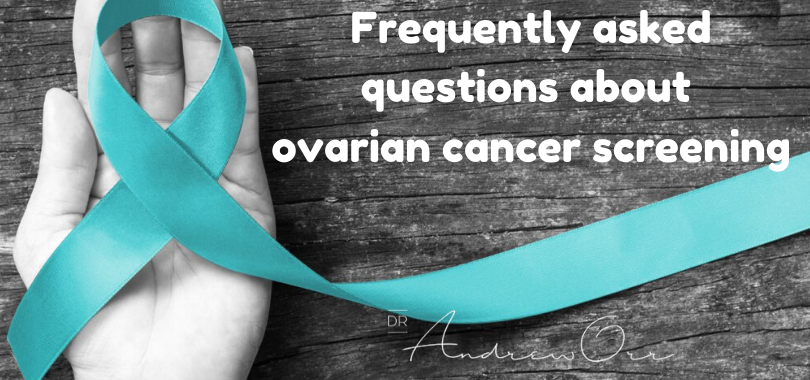I have recently put up a post about ovarian cancer and as usual lots of people had question about the symptoms and also about proper screening. Just like many other serious health issues, there are lots of myths out there and why it is important to talk about the facts only.
Before I go into the frequently asked questions about screening for ovarian cancer, I do need to say this. If you do have bloating, or some of the other common symptoms of ovarian cancer, please don’t get all anxious and run off thinking you have ovarian cancer.
Many of these symptoms can be indicative of endometriosis and adenomyosis too. This is why it is important to talk to your healthcare practitioner, or specialist about any concerns you have around any of the symptoms you may be getting. Early intervention and detection is the key to any disease, and ovarian cancer is exactly the same. Either way it is worth seeing someone a specialist in this field.
If you do have any of the symptoms from my post on ovarian cancer, please talk to your healthcare practitioner about a referral to an expert, or specialist in this field and get assessed properly.
Frequently asked questions about ovarian cancer screening
This information covers screening for ovarian cancer i.e. the testing of women at population risk who have no symptoms that might be ovarian cancer. This information has been developed to support discussion with a woman about screening for ovarian cancer. Most of this can be found at the Australian Cancer Council (www.cancer.org.au)and the National Breast and Ovarian Cancer Centre (www.nbocc.org.au)
Is there a screening test for ovarian cancer?
No. There is currently no evidence to support the use of any test, including pelvic examination, CA125 or other biomarkers, ultrasound (including transvaginal ultrasound), or a combination of tests, to screen for ovarian cancer.
A Pap test does not detect ovarian cancer; it is only used to screen for cervical cancer.
What about the CA125 blood test?
CA125 is a protein found in the blood. It is known as a tumour or cancer marker. Increased levels of CA125 may indicate ovarian cancer. However, there are many other conditions that can affect CA125 levels such as ovulation, menstruation, endometriosis, benign ovarian cysts, liver or kidney disease, and other cancers such as breast or lung cancer.
If CA125 levels are not raised, this does not completely rule out ovarian cancer, as about 50% of women with early-stage ovarian cancer have normal CA125 levels.
For these reasons, the CA125 test alone should not be used as a screening test for ovarian cancer. It can be used in the assessment of symptoms that may be ovarian cancer.
Can an ultrasound be used as a screening test?
A transvaginal ultrasound (TVUS) gives the best picture of the ovaries but while able to detect the presence of ovarian disease, a TVUS cannot distinguish between benign and malignant disease.
For this reason, transvaginal ultrasound should not be used as a screening test for ovarian cancer.
What if a woman decides she still wishes to have a CA125 blood test or ultrasound?
She should be informed that if either a CA125 or an ultrasound test is abnormal, it may be necessary to repeat the test, or to undertake further tests, which may include surgery to investigate the abnormal result.
The discovery and investigation of abnormal findings can result in unnecessary anxiety and the investigations can carry significant risks.
Final word
I hope this explains a few of the fact around screening for ovarian cancer and helps people understand why some perceived screening methods are not reliable. For more information, you should always talk to your healthcare practitioner, or specialist, and never ever diagnose yourself based on some stupid google search. Always see a qualified healthcare professional for all your healthcare advice. Your life could depend on it.
Regards
Andrew Orr
-No Stone Left Unturned
-Master of Women’s Health Medicine
-Master of Reproductive Medicine
-The Women’s Health Experts
